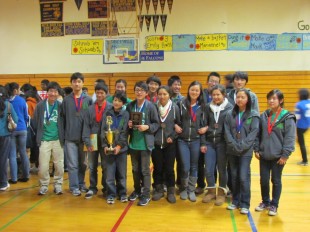
“This year, I feel like we have a group of people who are very confident with engineering events, which we have done poorly on in the past, so I’m super excited,” Kim said.
Senior Jeffrey Ling, another co-president of the Science Olympiad Club, agrees that there is “a lot of potential” in this year’s team.
“Paly has never made nationals, so we want to make this year the first,” Ling said. “There’s definitely a chance.”
Science Olympiad is a national science competition with 23 categories of events, which can be either studying or engineering events. Studying events require students to take tests in their specific area of expertise, while engineering events consist of students building a device and testing it at the competition.
According to Ling, testing opportunities were held in the past month for students interested in joining the team in the past month, and the teams were decided during Thanksgiving break.
“There are a lot of factors going towards the decision,” Ling said. “The testing results, of course, are really important. Then we also consider your schedule and commitment you can put into Science Olympiad, as well as past experience.”
At Paly, the Green Team and White Team compete as separate teams. While the Green Team aspires to make the national competition, the White Team aims for the state competition while gaining experience.
Sophomore Joseph Chang, who will compete with the White Team for the second year in a row, hopes that his team can make the state competition.
“I think both teams this year are the most promising I’ve seen in a while,” Chang said. “And White Team especially, I think this year has the chance to make states.”
But before making it to the states, teams must first win the Bay Area Regional Science Olympiad, which takes place on Feb. 9 at Foothill High School. To reach this preliminary goal, students are taking time outside of schoolwork to study for their events.
“A lot of it is self study,” Kim said. “But we help by checking in, giving books and recommending websites. We also organize study meetings so that people can come and meet with their partners to study.”
Chang is already studying by reading materials on the Science Olympiad Wiki page, as well as the official Science Olympiad website which has useful links.
“I spend, maybe, an hour a day studying up until February, when I’ll try amping up my studying,” Chang said. “Hopefully I won’t procrastinate.”
Others, like senior Sonia Targ, are just starting to prepare for the competition.
“I haven’t started studying for my events yet because I just found out which events I’ll compete in, but I plan to check out some books on the topic and study for at least a couple of hours each week,” Targ said, describing her study plan for her Green Team event.
The Science Olympiad club holds study sessions every Saturday and Sunday, open to all members.
“My favorite thing about Science Olympiad is that I get to learn about some really cool topics with my peers that aren’t necessarily taught in depth at school,” Targ said. “I like working with other ambitious students who share my interest in science.”
Below is a list of all the team members this year, according to an email from the Science Olympiad club.
Green Team:
Annie Chen
Gary Chen
Ken Chen
Alvin Kim
John Kim
Max Krawczyk
Grace Lin
Jeffrey Ling
Jasen Liu
Alex Lu
Nicholas Quach
Sonia Targ
Michael Wang
Jeffrey Yan
Stephenie Zhang
White team:
Richard Cao
Christine Chang
Joseph Chang
Haley Fang
Kenton Kwok
Albert Lee
Clara Lee
Sauyon Lee
Matthew Li
Raymond Li
James Pedersen
Lilia Tang
Felicia Wang
Jacqueline Woo
Michelle Xie
Alternates for White Team:
Tim Tran
Brian Lai

